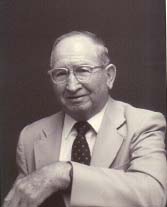
|
 |
|
{Page 158}

| Top of Page | Table of Contents | Home |
The word allelopathy was introduced in biological sciences in a 1937 monograph in German. Allelopathy remained unknown for three decades. In the early sixties, Dr. Elroy L. Rice, a young ecologist, became interested in plant succession in abandoned agricultural fields. He recognized four stages of plant succession in Oklahoma: the pioneer weed stage (duration, 2-3 years), the annual grass stage (duration, 9-13 years), the perennial bunch-grass stage (duration, 30-50 years), and the climax prairie. With single-minded devotion, he firmly established that chemical interactions between plants, allelopathy, is the major factor causing rapid disappearance of the pioneer weed stage and the long duration of the two middle stages. He showed that the long persistence of the two middle stages is due to the allelopathic inhibition of biological nitrogen fixation both symbiotic and asymbiotic. His book Allelopathy, a monograph published by Academic Press in 1974, is based largely on his research. It was the first book published in English dedicated to allelopathy. This volume was translated into Russian language in 1978. The revised and enlarged edition of this book, published in 1984, was translated into Japanese and Korean languages. These two books have been cited numerous times. Thanks to his indefatigable enthusiasm in extensive allelopathy research program, key note addresses at different national and international symposia, and invitational lectures delivered at various universities that inspired young biologists, allelopathy is now a distinct discipline in biological science.
Over 40 years of his teaching and research at the University of Oklahoma brought prestige to the university and earned him several prestigious awards and honors. In 1984 he was named "Oklahoma Scientist of the Year" by the Oklahoma Academy of Science. In 1995 the Alumni Association of the University of Chicago awarded him "Professional Achievement Citation as one of the World's Top Authorities in Allelopathy" and the Medical and Biological Science Alumni Association of the University of Chicago presented him the "Distinguished Service Award for a Life Time of Teaching and for more than 40 years of Pioneering Work in Allelopathy Research. " Dr. Elroy L. Rice received the "Molisch Award" from the International Allelopathy Society in 1996 for "Outstanding academic achievement and/or service relating to the field of allelopathy". It was the first award to be given in the field of allelopathy.
Born on a farm near Edmond, Oklahoma, and living there until his graduation from a nearby college (now the University of Central Oklahoma) young Rice developed keen interest in plants. He earned his M. S. in Botany in 1942 from Oklahoma University. After a brief service with U. S. Army Signal Corps and Air Force in World War II he enrolled in the University of Chicago and earned his Ph. D. in 1947. Upon completion of his degree he joined the Department of Botany and Microbiology at the University of Oklahoma where he served for more than three decades until his retirement in 1981. He became a professor in 1962, and in 1967 was promoted to "David Ross Boyd Professor", a highly prestigious position at the University of Oklahoma. His devotion to teaching earned him an "Alumni Teaching Award" in 1955 and a "Regent's Award for Superior Teaching" in 1966. He was an inspiring teacher, well admired by his students, 32 of whom earned a Ph. D. degree and many others earned an M. S. degree under his supervision. Many of his students considered Dr. Rice their mentor.
{Page 159}
Dr. Rice contributed nearly 100 publications to the literature including journal articles, several book chapters, and a few popular articles on allelopathy. His research received almost continuous funding from the U.S. National Science Foundation. His interest in allelopathy was not confined to research alone. He also made an effort to make allellopathy a household word. His book Pest Control with Nature's Chemicals published in 1983, and translated into Russian in 1986, was a brilliant success in that respect.
During a meeting in New Delhi, India, the International Allelopathy Society was formed on September 5, 1994. Although Dr. Rice was not present at that meeting, he was instrumental in assisting scientists from India and other countries in establishing the International Allelopathy Society. His strength and influence were prominent in the creation of the society, and his counsel and advice were often sought as the fledgling society grew. The International Allelopathy Society established the "Rice Award" given for the "Best single paper or article presented by a student at a symposium sponsored by the International Allelopathy Society".
Dr. Rice did not overlook science in Oklahoma. He was an ardent supporter and active member of the Oklahoma Academy of Science and held numerous positions with the society including the elective office of President in 1981. He also served as the President of the University of Oklahoma's chapter of Sigma Xi in 1955 and the Southwestern Association of Naturalists in 1970. Dr. Rice was an active member of the editorial boards of the Journal of Chemical Ecology, Allelopathy(the official journal of the International Allelopathy Society), and Allelopathy Journal.
The culmination of Dr. Rice's long career as a researcher and teacher is his last book Biological Control of Weeds and Plant Diseases: Advances in Applied Allelopathy, published in 1995. In this book he recommended that agricultural scientists in general develop a holistic approach to address all agricultural problems instead of discipline-oriented research. In his message (his last) to the second congress of International Allelopathy Society in 1999, he said, "To meet the ever growing demand for more food, feed and fiber, agricultural scientists are to pull together to enhance crop productivity and develop an environmentally compatible and sustainable agriculture based on allelopathic research. Sustainable agriculture can be accomplished only by incorporating allelopathy into agricultural management".
Dr. Rice died on August 9, 2000 at his home and is survived by his wife of 55 years, Esther, his daughter Linda, a brother, a sister and three grand children.
M. A. Bari Mallik
Agricultural Research & Extension Program
Langston University
Langston, Oklahoma 73050
George R. Waller
Department of Biochemistry
& Molecular Biology
Oklahoma State University
Stillwater, Oklahoma 74078
| Top of Page | Table of Contents | Home |